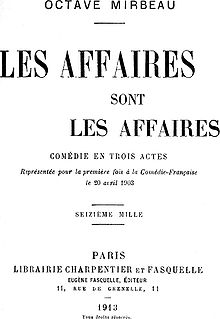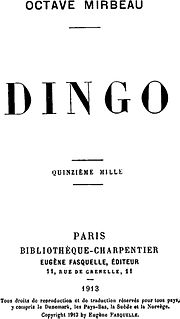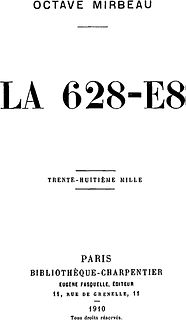
Valery Larbaud was a French writer and poet.

The Diary of a Chambermaid is a 1900 decadent novel by Octave Mirbeau, published during the Dreyfus Affair. First published in serialized form in L’Écho de Paris from 1891 to 1892, Mirbeau’s novel was reworked and polished before appearing in the Dreyfusard journal La Revue Blanche in 1900.

The Torture Garden is a novel written by the French journalist, novelist and playwright Octave Mirbeau, and was first published in 1899 during the Dreyfus affair. The novel is dedicated: "To the priests, the soldiers, the judges, to those people who educate, instruct and govern men, I dedicate these pages of Murder and Blood."

Business is business is a French comedy in three acts, by the novelist and playwright Octave Mirbeau, performed in April 1903 on the stage of Comédie-Française, in Paris, and worldwide acclaimed, especially in Russia, Germany and United States.

Dingo is a novel by the French novelist and playwright Octave Mirbeau (1913).

La 628-E8 is a novel by the French novelist and playwright Octave Mirbeau, published by Fasquelle in 1907. Part travelogue, part fantasy, part cultural commentary and critique, Mirbeau's book highlights its own unclassifiability: "Is it a diary?”, the narrator wonders. "Is it even the account of a trip?”

L'Abbé Jules is a novel written by the French journalist, novelist and playwright Octave Mirbeau, and published by Ollendorff in 1888.

Les Vingt et un Jours d'un neurasthénique is an expressionist novel by the French writer Octave Mirbeau, published by Charpentier-Fasquelle in August 1901.

Pierre Michel, is a professor of literature and a scholar specializing in the French writer Octave Mirbeau.

Un gentilhomme is a novel by the French novelist and playwright Octave Mirbeau, published by Flammarion in 1920, after his death. Only three chapters were published.
Octave Mirbeau’s Lettres de l’Inde are a series of eleven articles that appeared in 1885, first in Le Gaulois between February 22 and April 22, and then in Le Journal des débats, on July 31 and April 1. Signed under the pseudonym Nirvana, they were not collected in a volume until 1991.

Lucien is one of the central fictional characters in the novel Dans le ciel, by French writer Octave Mirbeau.

Célestine is the main character and the narrator of the French novel by Octave Mirbeau, The Diary of a Chambermaid, 1900.
Clara is the main character in the French Novel The Torture Garden, by Octave Mirbeau.
L'Amour de la femme vénale is the French title of a brief essay by French writer Octave Mirbeau on prostitution. Originally published in Bulgarian in Plovdiv, Bulgaria, in 1922 as Любовта на продажната жена. It was translated into French by Alexandre Lévy,, the essay was published in 1994 by Éditions Indigo and Côté Femmes and was accompanied an introduction by Pierre Michel, a professor specialising the writer Octave Mirbeau, and a preface by historian Alain Corbin. The essay was translated into English and Italian in 2005 by Bérangère de Grandpré.
Combats littéraires is the title of a 2006 collection of 187 articles and prefaces written by the French writer Octave Mirbeau, between 1876 and 1916, on literature, journalism, and publishing over the course of his long career as an influential journalist. Although Mirbeau collaborated with numerous daily newspapers, he was never officially assigned the work of literary reviewer. Of these articles, some 60 were published between 1925 and 1926 under the title Les Écrivains, and these are available on Wikisource.
Louis de Robert was a French writer, winner of the prix Femina in 1911.
Jean-Luc Seigle is a French contemporary dramatist, screenwriter and writer.














